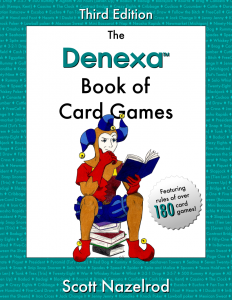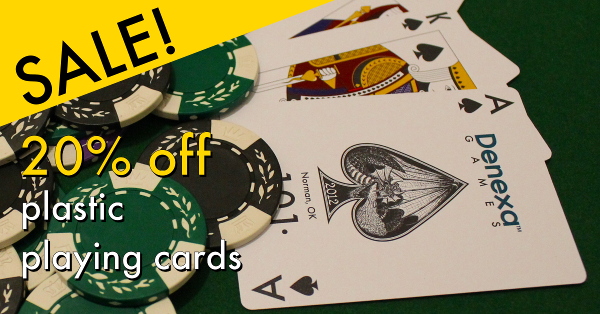Tonk
Tonk (also known as Tunk) is a quick-playing member of the Rummy family, best for two to four players. Because each hand is so short, it is often played in places like break rooms where players might have to leave on short notice. Tonk is often played for money to avoid the need for actual scorekeeping.
Tonk dates back to at least the 1930s, when it was played by members of Duke Ellington’s orchestra.
Object of Tonk
The object of Tonk is to be the first player to run out of cards, by discarding, spreading, and hitting other players’ spreads.
Setup
Tonk uses one standard 52-card deck of playing cards. Playing with Denexa 100% Plastic Playing Cards is always an excellent choice.
Before playing, it should be established whether the game is being played for money, and if so what the value of one stake is. If the game is not being played for money, each hand can simply be considered its own game.
Shuffle and deal five cards to each player. The deck stub is placed in the center of the table and forms the stock. The top card of the stock is turned face-up next to it; this card, the upcard, is the first card of the discard pile.
Game play
Each card in Tonk has a point value which is used to determine the value of the player’s hand. These values are the same as those in Gin Rummy, i.e. aces are worth one point, face cards are worth ten, and all others their face value.
Upon receiving their cards, players immediately calculate the total score of their hand before any cards have been played. If a player has been dealt a count of exactly 50, or a count of 11 or lower, they may show their cards and declare “Tonk,” which is considered an instant win, and all other players pay double the stake to that player. If multiple players have a tonk, the hand is considered a draw with no winner.
If nobody has a tonk, the player to the left of the dealer plays first. A usual turn will begin with the player drawing one card from either the stock or the discard pile, either spreading or hitting, then discarding.
A spread is equivalent to a meld in most other rummy games. A valid spread is three or four of a kind, or a run of three or more cards of the same suit in sequence. Aces may be either low or high, but a sequence cannot use it as both (K-A-2 is not a valid meld). When a player forms a spread, they may lay it face-up on the table in front of them. Once a spread has been laid down, it is no longer considered part of the hand. Laying a spread down is not mandatory; a player may keep the spread in their hand if they so desire.
A player may also hit their opponents’ spreads. A hit is extending a spread already on the table, either yours or an opponent’s, by playing a legal card to it. If an opponent has spread three of a kind and you hold the fourth card of that rank, you may lay off the fourth king onto the spread. Runs can also be extended; with a spread on the table of 9-10-J♣, you may lay off either the 8♣ or the Q♣ if you hold either of them. A player cannot move cards from one spread to another to facilitate laying off. A player may hit as many spreads as they are able to on one turn, but it is optional and is not required. When a player has one of their spreads hit, they may not hit or lay down any spreads on the next turn they take.
When a card is discarded, any player may slap it, a la Slapjack, if they can immediately play it to a spread. If multiple player slap the same card, the player whose hand is on the bottom wins the slap. The slapping player takes the card and plays their turn as normal, essentially skipping all of the players before them. Turn order continues with the player to the left of the slapping player.
Going out
There are many ways that a Tonk hand can end. Each of them has different requirements to fulfill and consequences to the game.
A player may drop on any turn, even on their first turn. To drop, a player simply spreads their cards face-up on the table prior to drawing, and all other players must then also reveal their hands. The player is essentially betting that they have the lowest total in unmatched cards in their hand. If they do, they win the hand, with each opponent paying the stake to them. If another player ties with them, or has a lower score, they are said to be caught and must pay the stake to each of their opponents with a lower or equal score. Additionally, each player must pay the stake to the player (or players, if there is a tie) with the lowest score.
If the stock runs out before anyone ends the hand in any other way, the players reveal their hands and compare the totals of their unmatched cards. The player with the lowest total wins the hand, and is paid one stake by each of their opponents. If there is a tie, the hand is considered a draw and no stake is paid.
If a player has no cards in their hand after discarding, they are said to have run out. They win the hand, and each of their opponents pays a single stake to them. However, if a player runs out of cards before discarding (i.e. they play their last card by laying down a spread or by hitting another player’s spread), they may call out “Tonk,” and are said to have tonked out. When a player tonks out, they are paid a double stake by each of their opponents.


